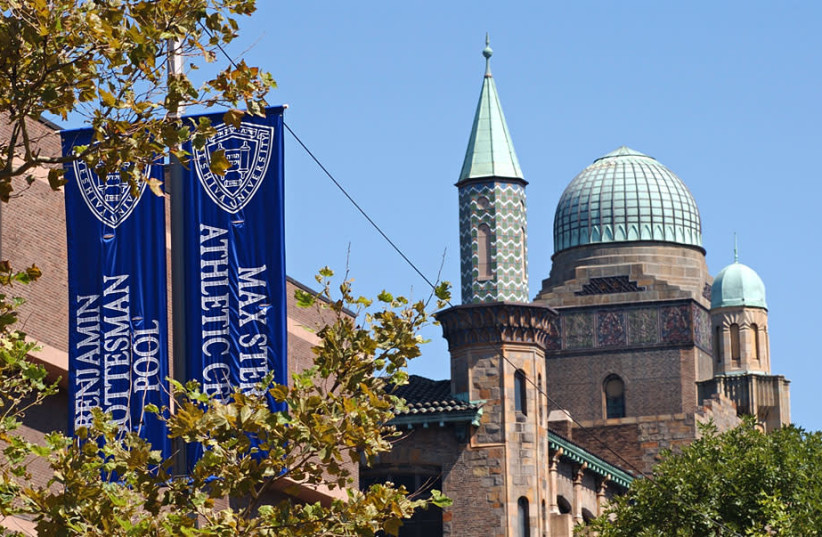YU students travel to El Salvador to supply Jews with mezuzahs, teffilin

The 10-day trip for nearly 40 pre-health students, led by Yeshiva University's Rabbi Daniel Coleman, will be the culmination of a year-long effort.
NEW YORK – This summer, Yeshiva University students will travel to El Salvador, bringing pairs of tefillin, mezuzahs, medical supplies and encouragement to a small, struggling Jewish community.
The 10-day trip for nearly 40 pre-health students, slated for this upcoming June and led by Yeshiva University’s Rabbi Daniel Coleman, will be the culmination of a year-long effort initiated by Coleman to build a relationship with Beit Knesset, a Sephardic synagogue, in Armenia, nearly 30 kilometers west of San Salvador, with a membership of nearly 60 families, as of February 2022.
“I discovered such a warm and beautiful community,” Coleman told The Jerusalem Post. “It was kind of shocking but also heartwarming to see how they celebrated Judaism even with so little.”
Beit Knesset’s membership, composed primarily of low-wage, itinerant workers in the construction and hospitality sectors, is traditional and observant, with weekday prayer services beginning as early as 5:30 a.m. to accommodate departure times for workers heading to the city.
Coleman says despite their commitment to traditional Jewish life, many are simply unable to afford the ritual objects commonplace to observant Jews in the United States, such as a pair of tefillin or mezuzahs.
“It’s a big expense for families to invite friends and loved ones to shul for kiddush after a bar mitzvah so they definitely can’t afford a pair of tefillin or a mezuzah,” Coleman said. “That was my impetus to act on a project.”
Coleman, upon returning home to the Washington Heights neighborhood of New York City, decided that he would return to the country with 36 pairs of tefillin and mezuzahs and 36 students by the following year to help meet the needs of the community.
Yitzchak Friedman, a Washington Heights-based software engineer who spends his evenings working as a sofer, was contacted by Coleman to certify that donated pairs of tefillin and mezuzahs that were kosher. “It was only a short matter of time before Daniel showed up to my home with a large bag of tefillin parts,” Friedman told The Post.
ENSURING THAT tefillin are indeed kosher takes roughly three hours, Friedman says. The process includes carefully taking apart the cowhide boxes, which are commonly glued or stitched together. The sofer examines the parchment paper inscribed with passages from the Torah for grammatical errors or faded letters that would automatically invalidate their kosher status.
Five pairs of tefillin have been collected and certified as kosher by Friedman for this upcoming trip, Coleman said. “Donations certainly continue to be appreciated,” he added.
Spreading the news of the trip
Coleman and his students have spread the news of the trip and fundraising through a link shared in congregation bulletins throughout Washington Heights, such as Mount Sinai Jewish Center, and at-home congregations of students across the country.
Students should expect a rewarding but intensive experience, Coleman said. They will spend time with Beit Knesset members while also visiting Bloom Hospital, a pediatric oncology hospital in San Salvador led by Dr. Michelle Ponsa, who is also a member of a local Masorti congregation.
Beyond religious items, Coleman is seeking donations of medical supplies, ranging from toothbrushes to over-the-counter medications, from community members and medical supply companies.
Coleman and his students are searching for PICC catheters to bring to the country as a means of ensuring a less painful chemotherapy delivery method for children. Bloom Hospital’s current treatment regime, due to a shortage of catheters, requires that chemotherapy be delivered through veins in their arms and legs. “This would alleviate a lot of pain for the children being treated if we could bring as many of these PICC catheters as possible,” Coleman said.
“These students know not to come if they can’t fit everything that they need for themselves in their hand luggage,” Coleman said. “Our suitcases will be for what we bring in terms of supplies, whether that’s medical supplies or Jewish supplies, like Kedem grape juice [for kiddush], tefillin and mezuzahs.”
Asked if he hopes for the trip to become an annual occurrence, Coleman answers with a resounding “Yes” and a nod to next year’s goals. “I’ve told Yitzchak and others that what can’t be given or checked in time, let’s definitely prepare it for next year’s trip.”
Jerusalem Post Store
`; document.getElementById("linkPremium").innerHTML = cont; var divWithLink = document.getElementById("premium-link"); if (divWithLink !== null && divWithLink !== 'undefined') { divWithLink.style.border = "solid 1px #cb0f3e"; divWithLink.style.textAlign = "center"; divWithLink.style.marginBottom = "15px"; divWithLink.style.marginTop = "15px"; divWithLink.style.width = "100%"; divWithLink.style.backgroundColor = "#122952"; divWithLink.style.color = "#ffffff"; divWithLink.style.lineHeight = "1.5"; } } (function (v, i) { });

